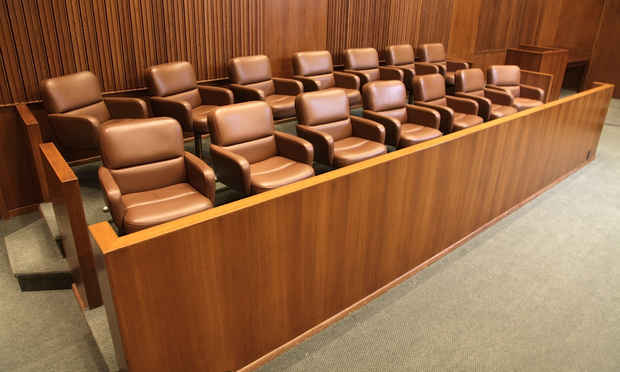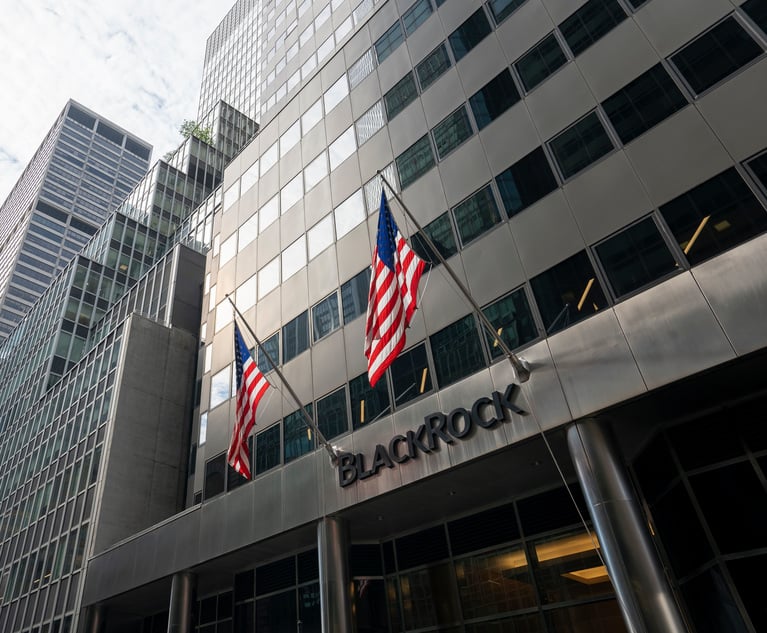The Show Must Go On: Resuming Jury Trials Post-Pandemic
As states tentatively reopen, courts across the country are grappling with unprecedented challenges to resuming jury trials safely.
July 21, 2020 at 04:25 PM
6 minute read
The original version of this story was published on National Law Journal

From wearing face masks in public to homeschooling our kids, we all find ourselves doing things we could not have imagined just three months ago. For the two of us, that includes spending far more time than usual outside the courtroom. Since late March, jury trials have ground to a halt in the wake of the pandemic. Now, as states tentatively reopen, courts across the country are grappling with unprecedented challenges to resuming jury trials safely.
This article explores how one of the most socially interactive legal processes—jury selection—can conform to social-distancing guidelines, along with ways the pandemic itself might influence the jury pool and affect deliberations.
Jury Selection
Jury selection as we know it is by no means a socially distant process. Courts typically summon hundreds of prospective jurors at once into small courtrooms and pack them into rows, where they are asked to pass out forms and share pens and clipboards. They are asked questions by multiple lawyers, and maybe even the judge, all in close proximity. They are trapped inside, sometimes for an entire day. This practice, which once seemed so normal, now makes us cringe. How can courts continue to conduct jury selection in a post-pandemic world?
One possible solution is to whittle down the number of jurors with mail-in or online questionnaires. A preliminary hardship questionnaire would be used in advance of individual voir dire to prescreen those who cannot serve due to recognized hardships, such as financial difficulties or child care responsibilities. In a second phase, a case-specific questionnaire developed by the parties would be accessible to jurors to further screen for bias and could even form the basis of the parties' cause and peremptory challenges. If desired, the judge or counsel could conduct additional inquiry with individual jurors via telephone or videoconference.
Another solution may be to alter the location of jury selection. Some courts have proposed moving them to larger venues, such as convention centers or movie theaters. Others suggest relying on videoconferencing technology to conduct voir dire orally. One Dallas judge recently implemented this approach with more than two dozen prospective jurors, asking them to raise their hands in response to questions about potential bias and permitting the lawyers to ask follow-up questions.
Courts may also conduct jury selection in smaller, staggered groups, with selection proceeding as usual, but in several stages of smaller groups, arriving on different days and at different times. Alternatively, individual jurors could be instructed to arrive at specific interview times, with each side having an equal amount of time to question each juror until a sufficient number have been passed for cause.
Lastly, some courts may opt to use smaller juries. While federal courts and some states already operate with just six jurors in civil trials, the laws in many others allow the parties to stipulate to juries with fewer jurors than prescribed by statute. A smaller jury reduces the number needed for jury selection and could better satisfy spacing restrictions in the jury box and deliberation room.
Jury Pool Composition and Jury Deliberations
The pandemic not only poses significant social-distancing challenges to jury selection, but also threatens to undermine the representative makeup of juries and spur more acrimonious deliberations.
Because seniors and those with preexisting health conditions are especially vulnerable to COVID-19, judges are more likely to excuse these individuals from jury service. Such a result may harm defendants, as older jurors tend to be more conservative and more receptive to defense themes. On the other hand, excusal of those with underlying health conditions may benefit defendants, because those individuals may be more sympathetic to plaintiffs seeking compensation for their injuries.
Some people may simply refuse to participate in jury duty due to fears of contracting the virus. Recent polling demonstrates a clear association between political ideology and the level of concern related to the virus, with conservatives (who often side with civil defendants) tending to be less apprehensive than their liberal peers (who are often plaintiff-friendly).
Moreover, prior studies have shown that jurors who exhibit anxiety-related responses to health and safety threats, even if unrelated to the underlying lawsuit, are more likely to support plaintiffs in tort cases. Thus, a large-scale excusal of those acutely concerned about COVID-19 would probably benefit defendants.
The pandemic may also affect jury decision-making. For example, inconsistent and sometimes conflicting messages from regulatory bodies and government officials have spawned increased distrust of the government, meaning that jurors may lack confidence in what authorities are doing to protect people from health hazards. This could spell trouble for defendants who rely on their adherence to government regulations as a defense to liability. Quite interestingly, opinion polls have also demonstrated that the pandemic has exacerbated "confirmation bias" among the population—e.g., those who previously held positive attitudes toward corporations viewed corporate responses to the pandemic positively, while those with negative beliefs viewed the same responses skeptically, further intensifying their negative feelings. This polarization might lead to more contentious deliberations and hung juries.
The world as we know it has drastically changed, and the courtroom is no exception. Every aspect of the jury trial, from selection to deliberations, will be affected by the ongoing pandemic. But the show must go on, so litigants and courts alike must embrace measures that both protect prospective jurors' well-being and each party's right to a fair and impartial jury.
Allison Brown is an experienced litigator and trial lawyer in the mass torts, insurance and consumer litigation group at Skadden, Arps, Slate, Meagher & Flom, and Christina Marinakis is a shareholder and director of jury research at Litigation Insights, where she assists trial counsel with jury research during jury selections across the country. Brown and Marinakis recently secured a win for Johnson & Johnson following a two-week trial in which plaintiffs sought up to $5 billion in damages over the company's baby powder product.
This content has been archived. It is available through our partners, LexisNexis® and Bloomberg Law.
To view this content, please continue to their sites.
Not a Lexis Subscriber?
Subscribe Now
Not a Bloomberg Law Subscriber?
Subscribe Now
NOT FOR REPRINT
© 2025 ALM Global, LLC, All Rights Reserved. Request academic re-use from www.copyright.com. All other uses, submit a request to [email protected]. For more information visit Asset & Logo Licensing.
You Might Like
View All
Apple Disputes 'Efforts to Manufacture' Imaging Sensor Claims Against iPhone 15 Technology

Special Counsel Jack Smith Prepares Final Report as Trump Opposes Its Release
4 minute read

Who Got the Work: Gibson Dunn and Wilmer to Defend BlackRock in ESG Antitrust Lawsuit
2 minute readLaw Firms Mentioned
Trending Stories
- 1The FTC’s Noncompete Rule Is Likely Dead
- 2COVID-19 Vaccine Suit Against United Airlines Hangs on Right-to-Sue Letter Date
- 3People in the News—Jan. 10, 2025—Lamb McErlane, Saxton & Stump
- 4How I Made Partner: 'Be Open With Partners About Your Strengths,' Says Ha Jin Lee of Sullivan & Cromwell
- 5Essential Labor Shifts: Navigating Noncompetes, Workplace Politics and the AI Revolution
Who Got The Work
Michael G. Bongiorno, Andrew Scott Dulberg and Elizabeth E. Driscoll from Wilmer Cutler Pickering Hale and Dorr have stepped in to represent Symbotic Inc., an A.I.-enabled technology platform that focuses on increasing supply chain efficiency, and other defendants in a pending shareholder derivative lawsuit. The case, filed Oct. 2 in Massachusetts District Court by the Brown Law Firm on behalf of Stephen Austen, accuses certain officers and directors of misleading investors in regard to Symbotic's potential for margin growth by failing to disclose that the company was not equipped to timely deploy its systems or manage expenses through project delays. The case, assigned to U.S. District Judge Nathaniel M. Gorton, is 1:24-cv-12522, Austen v. Cohen et al.
Who Got The Work
Edmund Polubinski and Marie Killmond of Davis Polk & Wardwell have entered appearances for data platform software development company MongoDB and other defendants in a pending shareholder derivative lawsuit. The action, filed Oct. 7 in New York Southern District Court by the Brown Law Firm, accuses the company's directors and/or officers of falsely expressing confidence in the company’s restructuring of its sales incentive plan and downplaying the severity of decreases in its upfront commitments. The case is 1:24-cv-07594, Roy v. Ittycheria et al.
Who Got The Work
Amy O. Bruchs and Kurt F. Ellison of Michael Best & Friedrich have entered appearances for Epic Systems Corp. in a pending employment discrimination lawsuit. The suit was filed Sept. 7 in Wisconsin Western District Court by Levine Eisberner LLC and Siri & Glimstad on behalf of a project manager who claims that he was wrongfully terminated after applying for a religious exemption to the defendant's COVID-19 vaccine mandate. The case, assigned to U.S. Magistrate Judge Anita Marie Boor, is 3:24-cv-00630, Secker, Nathan v. Epic Systems Corporation.
Who Got The Work
David X. Sullivan, Thomas J. Finn and Gregory A. Hall from McCarter & English have entered appearances for Sunrun Installation Services in a pending civil rights lawsuit. The complaint was filed Sept. 4 in Connecticut District Court by attorney Robert M. Berke on behalf of former employee George Edward Steins, who was arrested and charged with employing an unregistered home improvement salesperson. The complaint alleges that had Sunrun informed the Connecticut Department of Consumer Protection that the plaintiff's employment had ended in 2017 and that he no longer held Sunrun's home improvement contractor license, he would not have been hit with charges, which were dismissed in May 2024. The case, assigned to U.S. District Judge Jeffrey A. Meyer, is 3:24-cv-01423, Steins v. Sunrun, Inc. et al.
Who Got The Work
Greenberg Traurig shareholder Joshua L. Raskin has entered an appearance for boohoo.com UK Ltd. in a pending patent infringement lawsuit. The suit, filed Sept. 3 in Texas Eastern District Court by Rozier Hardt McDonough on behalf of Alto Dynamics, asserts five patents related to an online shopping platform. The case, assigned to U.S. District Judge Rodney Gilstrap, is 2:24-cv-00719, Alto Dynamics, LLC v. boohoo.com UK Limited.
Featured Firms
Law Offices of Gary Martin Hays & Associates, P.C.
(470) 294-1674
Law Offices of Mark E. Salomone
(857) 444-6468
Smith & Hassler
(713) 739-1250








